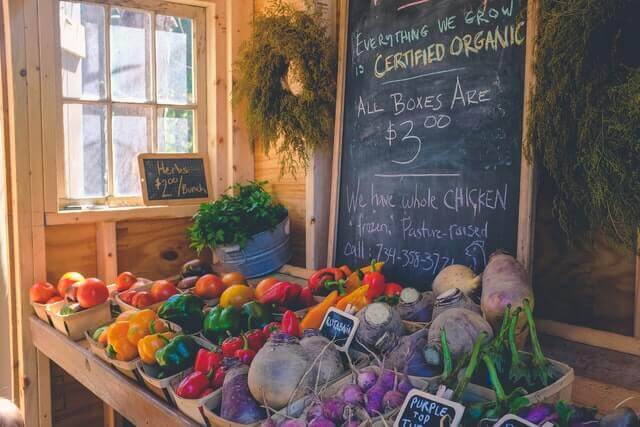A local food economy produces bountiful bunches of kale, locally created cheeses, seasonal fruits, and freshly baked bread at your local farmers market. You may consume more locally grown produce and other goods from local farmers and producers when you eat locally.
Eating locally grown food has several advantages, including environmental, economic, social, and health benefits.
1. The Food Is Extremely Fresh In The Local Area
Food grown or produced in your region, like many grocery commodities, is not imported from faraway states or nations. This means that local food, especially vegetables, is frequently more fresh and flavorful than nonlocal cuisine. If you’ve ever had a wonderfully ripe tomato or a box of strawberries from your local farmers market, you’ll understand what I mean. Local food sold at farmers markets is frequently gathered or harvested just a day or two before the market, or even on the market day.
As a result, some fruits and vegetables can ripen longer on the vine or grow in more favourable conditions than if they had to travel to the grocery store. This may make the produce sweeter, juicier, and tastier, depending on the type of produce. Other types of local food, such as eggs from a chicken farmer, are typically fresher than alternatives from further away.
2. Locally Grown Food Is Frequently More Nutritious
Fruits and vegetables may lose nutrients during shipping and processing, as well as when resting on grocery store shelves. Vitamin C, a water-soluble component necessary for healthy skin and tissues, begins to deteriorate in fresh fruits and vegetables immediately after harvesting.
In addition, the antioxidant content of several fruits and vegetables declines with storage. Food-derived antioxidants play a crucial role in the battle against disease-causing reactive molecules known as free radicals. Because locally grown produce does not have to travel long distances or sit in storage for long periods of time, it retains more nutrients.
Although this isn’t always the case, fresh asparagus from the farmers market is likely to be more nutritious than the bunch you see in the store from afar. It’s important to remember that all fruits and vegetables, whether fresh or frozen, local or not, provide essential nutrients and are healthy additions to your diet. However, if you have the opportunity to purchase locally grown options, you may get the most nutritional bang for your buck.
3. Eating Locally Allows You To Try Different Cuisine
If you buy at farmers markets or local food co-ops, you will almost surely be introduced to a new or unique food cultivated in your region. Finding these objects is an excellent way to learn more about your community’s food history and agricultural methods. Maybe you’ll find a new favourite meal or ingredient.
Over the years of shopping at farmers markets, I’ve tasted locally grown and milled wheat, cave-aged cheeses, teas made from herbs and plants foraged in my state, and many other unique things.
Signing up for a community-supported agriculture (CSA) share is another great way to try local foods you may not have tried before. CSA boxes are filled with produce and prepared for consumers directly by farmers. Some of the vegetables and fruits in these boxes are hard to find in stores, such as romanesco, celeriac, radicchio, and pattypan squash.
4. Eating Locally Improves The Economy Of Your Town
Your money is more likely to stay in the community when you buy locally sourced food. According to certain research, local food has a multiplier impact, which means it helps to increase employment and revenue in a community, among other things.
Spending money in your community may have the same effect on the local economy that a stimulus package has on the national economy. Local firms not only offer jobs for citizens, but their owners and employees are more inclined to reinvest their earnings in other local businesses and institutions, so strengthening the regional economy.
5. Eating Locally Teaches You About The Production Of Your Food
One of my favourite components of buying local food is making connections with farmers and food producers. Developing ties with people who raise your food is a terrific way to build community. You may ask inquiries while also learning about farming procedures. Such associations may help you build a stronger appreciation for your food.
Conclusion
I feel more pleased and conscious when I have a connection to the food I eat. Local food may evoke good feelings and improve your mood in the same way that a beloved family dish does.
